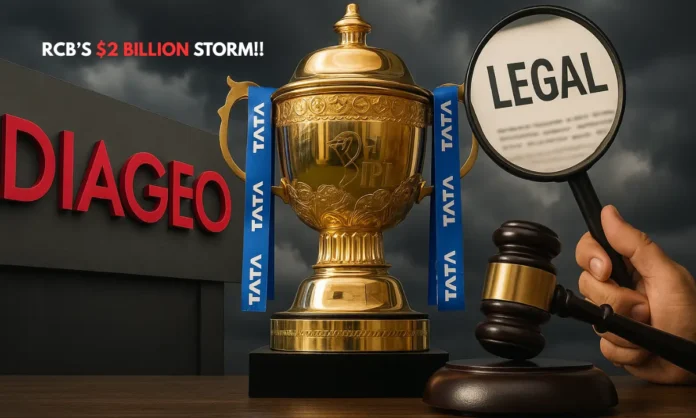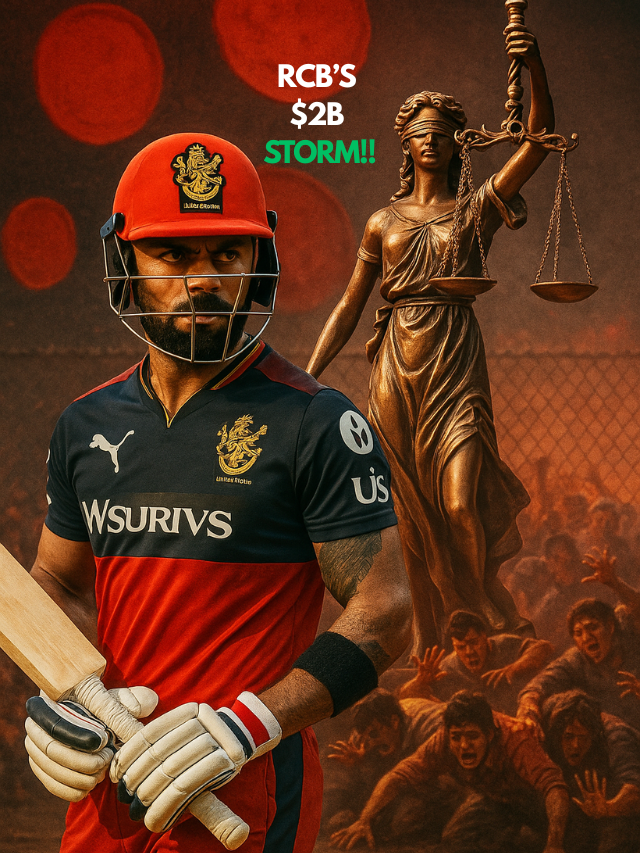Summary
- UK-based Diageo is reportedly exploring a $2 billion sale of its stake in Royal Challengers Bengaluru (RCB), amid growing scrutiny.
- United Spirits, Diageo’s Indian arm, denies the sale plans, calling media reports speculative and misleading.
- The development comes as RCB reels from a stadium stampede tragedy and faces government pressure over liquor-linked branding.
Turmoil Behind the Trophy: The Real Stakes in Diageo’s RCB Ownership
When Royal Challengers Bengaluru finally lifted their maiden IPL trophy in 2025, it should’ve been a moment of brand jubilation. Instead, what followed was a storm of scrutiny—both legal and commercial. At the eye of this storm sits Diageo Plc, the British alcoholic beverage giant that owns RCB through United Spirits Ltd. A Bloomberg report now suggests Diageo is evaluating a partial or full exit, potentially valuing the deal at ₹17,000 crore (~$2 billion). But even before the ink on the speculation could dry, United Spirits issued a regulatory denial, calling the story “speculative in nature.”
This isn’t just about cricket or company restructuring. It’s about the uneasy intersection of corporate ambition, social media success, political pressure, and public tragedy. As RCB’s social stock soars—with over 22 million Instagram followers—its corporate foundations are under fire. And the questions won’t go away: Why now? What’s prompting a potential sale? And who really controls the narrative?
🚨 RCB owner Diageo Plc is exploring options for a potential sale of IPL team Royal Challengers Bengaluru, valued at up to $2 billion. (ET) pic.twitter.com/KFxQMefiUT
— Indian Tech & Infra (@IndianTechGuide) June 10, 2025
Stake Sale or Strategic Distraction? What the Diageo-United Spirits Rift Reveals
- Diageo is reportedly seeking up to $2 billion for its RCB stake but has not confirmed the process.
- United Spirits, the operational owner of RCB, has denied any ongoing sale discussions in a BSE filing.
- Regulatory analysts suspect the denials may mask internal debate or preempt market destabilisation.
- The speculation coincides with broader policy pressures against alcohol-linked cricket branding in India.
The sharp uptick in United Spirits’ share price—rising 3.3% after Bloomberg’s report—was a clear market signal: investors believe there’s something brewing. United Spirits’ formal rebuttal, stating “it is not pursuing any such discussions,” aimed to quash rumours but left the door ajar. After all, corporate strategy often speaks loudest through what it omits.
India’s health ministry has been pressing hard to curb tobacco and alcohol surrogacy in sports. Diageo, long criticised for navigating such restrictions via soft drink branding and player endorsements, finds itself cornered. Add to this RCB’s sudden rise in brand valuation following their long-awaited IPL win, and the logic for a lucrative exit becomes clearer.
Legal Heat and Political Fallout: The Bengaluru Stampede Haunts RCB
- On June 4, a stampede at M Chinnaswamy Stadium killed 11 people during RCB’s victory celebrations.
- Nikhil Sosale, RCB’s head of marketing and revenue, was arrested in connection with the tragedy.
- Allegations surfaced that Chief Minister Siddaramaiah directly ordered Sosale’s arrest.
- Karnataka High Court refused interim relief, citing lack of procedural violation evidence.
The joy of an IPL title was short-lived. Hours after celebrations began, they ended in disaster. As crowds swelled beyond control, chaos ensued—and lives were lost. The Central Crime Branch wasted no time, arresting top RCB executive Nikhil Sosale. His lawyers claim the arrest was politically driven and lacked proper investigative procedure. But the Karnataka High Court’s stance was clear: unless proven otherwise, the arrest stands.
The fallout has created a toxic brand environment. Diageo now not only manages a winning franchise but one whose leadership is embroiled in legal controversy. The optics are brutal—especially for a foreign company whose core product is already under political watch.
Digital Royalty vs Ground Reality: RCB’s Social Boom Masks Institutional Cracks
- RCB is now the most followed IPL team on Instagram, with nearly 22 million followers.
- The franchise saw exponential growth after its 2025 title win, overtaking CSK and MI.
- Critics argue that social success has become a double-edged sword, masking governance gaps.
- RCB’s ownership history—from Mallya to Diageo—reflects deeper issues of stewardship in Indian cricket.
RCB’s digital empire is thriving. Once trailing behind Chennai Super Kings and Mumbai Indians, the Bengaluru team surged past them in 2024–2025 thanks to a strategic blend of on-field victories and viral content. However, behind the metrics lies a less glamorous truth: the franchise has now been through two controversial ownerships. Vijay Mallya’s reign ended in scandal. Diageo’s, despite steadying the ship, is now under public questioning.
The team’s reputation is paradoxically buoyed by its fans and bruised by its handlers. The juxtaposition couldn’t be starker. At one end is Virat Kohli’s enduring legacy and Gen Z fandom. At the other is a swirl of shareholder anxiety, political heat, and regulatory fog.
Exit Over Excellence? What RCB’s Future Tells Us About Corporate Cricket
Whether Diageo exits or not, the RCB saga has exposed a new truth about cricket’s corporate underbelly. No longer just about the game, franchises like RCB are asset classes—malleable, saleable, and expendable depending on policy winds and public pressure.
In the age of social-first fandom and politically conscious branding, owning a cricket team is no longer just a trophy asset—it’s a geopolitical and ethical calculation. With liquor ads in the crosshairs and executive arrests on the docket, RCB is ground zero for India’s reckoning with sports commerce.
The irony? RCB may be at its commercial peak just as its parent is considering a strategic retreat. And that, more than any cricketing stat, tells you everything you need to know about how the IPL has evolved.



